I am back to Yanamono, and the rainforest is beautiful as always.
|
After January snowstorms in Wisconsin, I don’t mind sweating for a while. And sweating, I am. Peru is south of the
Equator, thus it is summer here, and enero in Peru is often pretty warm. It seems hotter than usual, though, and the
river, which should be rising at this time of year, is actually dropping precipitously. When I left Iquitos nearly a
week ago, we were already approaching a record low river level, for this time of year. Each day I go down more and more
steps to reach my dugout canoe, and each day I think, well, tomorrow the river will be rising, and each day, it isn’t.
Iquitos is a little more than 100 meters (300 feet) above sea level. At Yanamono, the river needs to be at 110 meters
in order for boats to enter the stream, and at about 116 meters, the water is beginning to lap over the path between my
house and the dining room. We began the year at 114 meters, and in the last almost-two weeks, it has fallen three
meters, to about 111.5. Pam was out at Napo last week, and sent photos of the Napo River at levels lower than I have
ever seen. Rio Napo has its sources in Ecuador, while the Amazon gets its water from farther south, in the Peruvian
Andes, so the two rivers are not always in sync. But for the moment, both are unusually low.
|
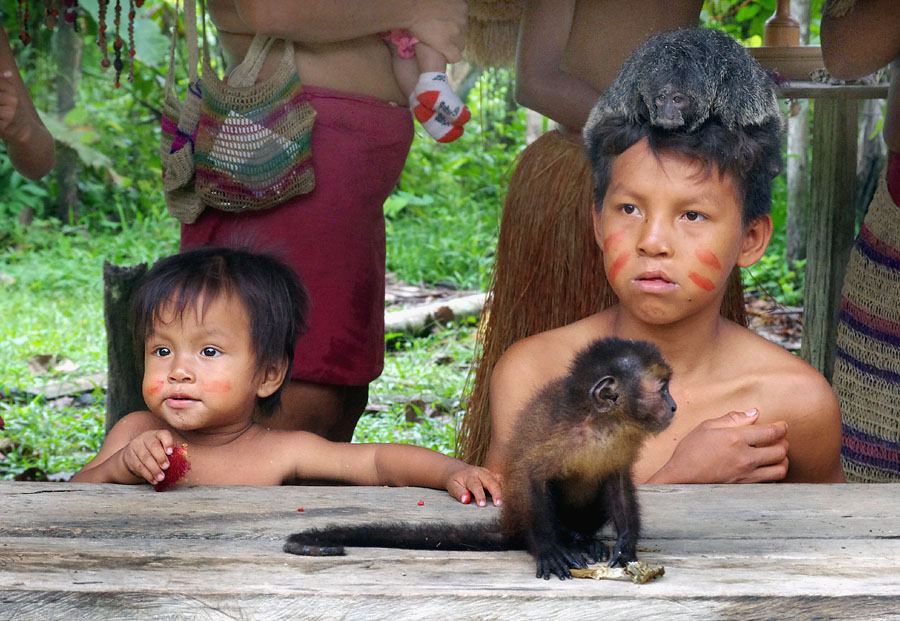 Photo Credit: Bob Pelham Photo Credit: Bob Pelham
|
I do appreciate being able to walk to the Lodge for coffee and meals – I remember having to resort to my dugout in
early February, just a couple of years back – but it’s time for the river to start behaving itself and come up as it
should.
There is a new cat at the Lodge, and a new dog. The dog, Run-Run, is a hyperactive, extremely shy puppy who adopted
us a few months ago. He was skulking around when I was here in November, but has graduated to being Lodge Dog and has a
dish outside the administrator’s office. He keeps wanting to approach me, and wags his tail and jumps around and
follows me, and bows with his front paws outstretched, his nose to the ground, and his soft brown eyes rolling coyly up
at me, but quickly retreats if I actually stop and invite him over to be petted.
The cat was presented as a male, named Koko, but Rider says she pulled a joke on them when a litter of kittens
appeared. The poor animal hardly looks old enough to be a mother – she must be six months of age or so – but cats do
start young. I asked about the kittens, and Rider says she wanted nothing to do with her offspring and abandoned them
completely. He tried to give them milk, they were just too young, and all died. That’s sad for them, but was actually
probably a wise move on the part of the young mother. Now I want to get a cat carrier and haul her into the city and
get her fixed. She will live much longer, and have a much easier life, if I can get that done before she is knocked up
again by the handsome but skittish tom who is also hanging around. And heaven knows, though one or two cats are a boon
to a home, or a lodge, flocks of them are not so good.
Except for the cat (now Koka, the female form of the name) and Run-Run, there has not been much in the way of Animal
Adventures since I got back. I did, however, find an ant in my mosquito net the other night. It was an isulilla
(ee-soo-LEE-jah), not as large as its cousin the isula, whose bite has been known to make grown men cry, but the
five-eighths inch/centimeter and a half-long isulillas are still nothing to mess with. Their bite is very painful, and
lasts for hours. I therefore did not wish to share my bed with one.
It is not advisable to attempt to crush these ants with bare fingers or bare feet, since they resent such treatment
and fight back, ferociously. The ant was on the inside of my mosquito net, crawling around on the roof. I got out a
sponge with a layer of Scotchbrite, the scrubby green stuff, and a thick pad, and reached inside the net with the
sponge, and on top of the net with the pad, and attempted to squish the ant between the two. The attempt did not work,
and he just dropped onto the sheet. I then lifted the mosquito net and brushed him off onto the floor. There I could
smash him between the rough sponge and the floor. You have to be very determined in this operation, however, since
these guys are difficult to kill. You need to roll them back and forth several times over the cracks between the floor
boards, in order to grind them into pieces, otherwise they continue to roll their eyes at you and gnash their fearsome
jaws, and if they get a chance will bite viciously even as they are dying. I feel bad for killing a living thing, but
believe me, rolling over on one of these in the middle of the night would be a distinctly unpleasant experience. It was
a relief to shake the pieces of former ant into the sink and wash them down the drain.
Now I am just hoping he was not one of a colony in the vicinity. I will keep my eyes open for others.
|
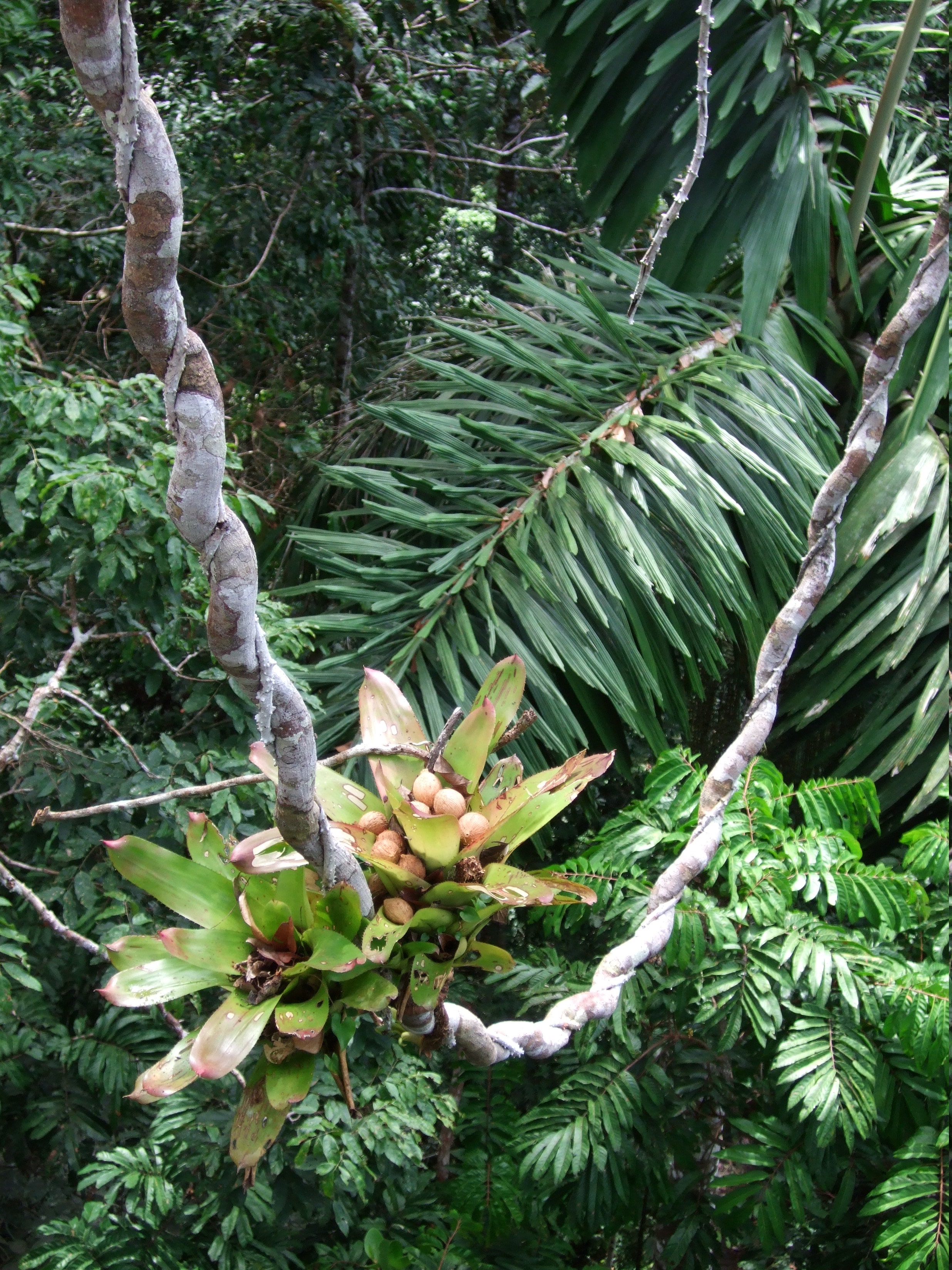
|
Since December, there has been an outbreak of some virus which causes high fever, very sore throat (people say they
can hardly stand to swallow food), cough, headache, body aches, general malaise, and runny nose. No one is dying of it,
and those who have been tested are negative for COVID. It is not clear whether this is influenza or some other virus,
but it has afflicted the many people hereabouts. The omicron coronavirus variant has also begun to show up, though by
now, the vast majority of Peru’s people have already had COVID-19 at least once, and the government has done a heroic
job of getting people vaccinated – most of our patients have had two doses of the vaccine, and a good number of them
have had a booster – so I think most of what we are seeing in the clinic is probably the non-COVID virus. Of all the
patients we have been seeing, at least a quarter of them have some version of viral upper respiratory infection. I have
been preaching water, water, water, lots of rest, and water, water, water, and no, a shot of antibiotic is not going to
cure you. I understand you are miserable, and I totally sympathize, but I still cannot cure this one. Your own body is
going to have to do that. Thank goodness, no one is looking likely to die, and I have no way to know whether what
afflicts them is the omicron variant of COVID, or this other, unnamed virus. I tell them it doesn’t make a lot of
difference. A virus is a virus, and antibiotics will not save you. You need to rest as much as you can, drink lots and
lots of water, and wait for it to go away. If you would like to know, for your own peace of mind or to contribute to
the epidemiological data, whether it is or isn’t COVID, you can go to Indiana or Iquitos and be tested. The tests are
widely available, and affordable or free. Most people don’t bother. Some don’t want to know, if they have COVID
(again).
|
In Iquitos, many people wear masks, though some wear them beneath their noses, or even better, tucked below their
chins, ready to pull up, should they enter a conversation with a masked person. Many others sport no facial coverings
at all. No one chastises anyone else for wearing or not wearing a mask, and no one gives anyone a dirty look or a makes
a threatening comment. Masks are a non-issue. You wear one, or you don’t wear one, period.
Meanwhile, I am wearing a mask in places where normally, I would not bother. I wear a mask to dinner at the Lodge,
even though there are only two employees and me there, and I wear a mask in the clinic when talking to the clinic staff.
With patients, it’s a KN-95 mask, and masks are handed out to patients who arrive without one. So far, I have escaped
illness, but it is probably only a matter of time before one virus or another gets me. Every time I get a little tickle
in my throat, or a sneeze pops out, I think, uh-oh, here it comes.
Our wonderful young doctor, who is great when he is present but is currently (again) in Brazil trying to work through
some bureaucratic problem, will be with us for only a few months longer. As is true of most of his compatriots, he
wants the prestige, and extra income, of a specialty, and is therefore planning on leaving us in order to pursue
residency. While I was in the city, I paid a visit to the Dean of the Iquitos medical school, to see if there isn’t
some way to tap into a pipeline of docs for the clinic. They suggested I try the Colegio Medico, the professional
licensing organization for doctors, and there, I was told that physicians are a tight commodity right now. All the
hospitals are advertising for them, and they are paying eight or nine thousand soles a month for their services. We
could pay that, and they wouldn’t be working exclusively with COVID patients, which has to be a plus. However, we don’t
have WiFi at the clinic, and that is a big negative for these young, technology-in-the-hand-oriented people. Yoko at
the Colegio Medico said that occasionally people come looking for positions, but that mostly, everyone is being snapped
up by the hospitals. She might be able to find someone for a month or two, while they are waiting to go to their SERUM
positions (their year of national health service), but that would mean a newly fledged doctor, for only a short period
of time. I would really, really like to get someone, preferably post-SERUM, for a longer stretch. Unfortunately, this
seems an unlikely prospect, at least until the pandemic slacks off. It has always been tough to persuade physicians to
come to the wilds of the rainforest, but the pandemic has made it much more difficult. Hopefully, in a few more months,
when the pandemic has died down somewhat (have we heard this before, do I hear an echo?), it might be easier. For now,
doctors are a scarce and precious commodity.
23 enero 2022
The river is finally coming up, just a little. Two months from now, we will probably be wishing for it to slow down
and not rise so fast. But for now, it is good that the cycle is back to its normal flow.
|
I am getting to be such a wimp. I keep grousing about trips to Iquitos, but one day in January, just getting to the
clinic became a challenge. One afternoon, the clouds opened and a genuine Amazon drizzle (which would be a downpour
anywhere else) was let loose. By the time I left my house to head back for afternoon clinic hours, the rain had been
gushing down for two hours, and the water in the stream had risen significantly, and was racing along. My dugout was
three-quarters filled with water, and once I sloshed and scooped all that out, I had to aim it upstream toward the
village, execute a sharp turn, and paddle like mad just to get to the other side – which is not more distant than two or
three times the length of the canoe. I chained the canoe carefully to a sturdy post on the far bank, stepped very
cautiously up the slippery steps, and arrived at the clinic without mishap.
|
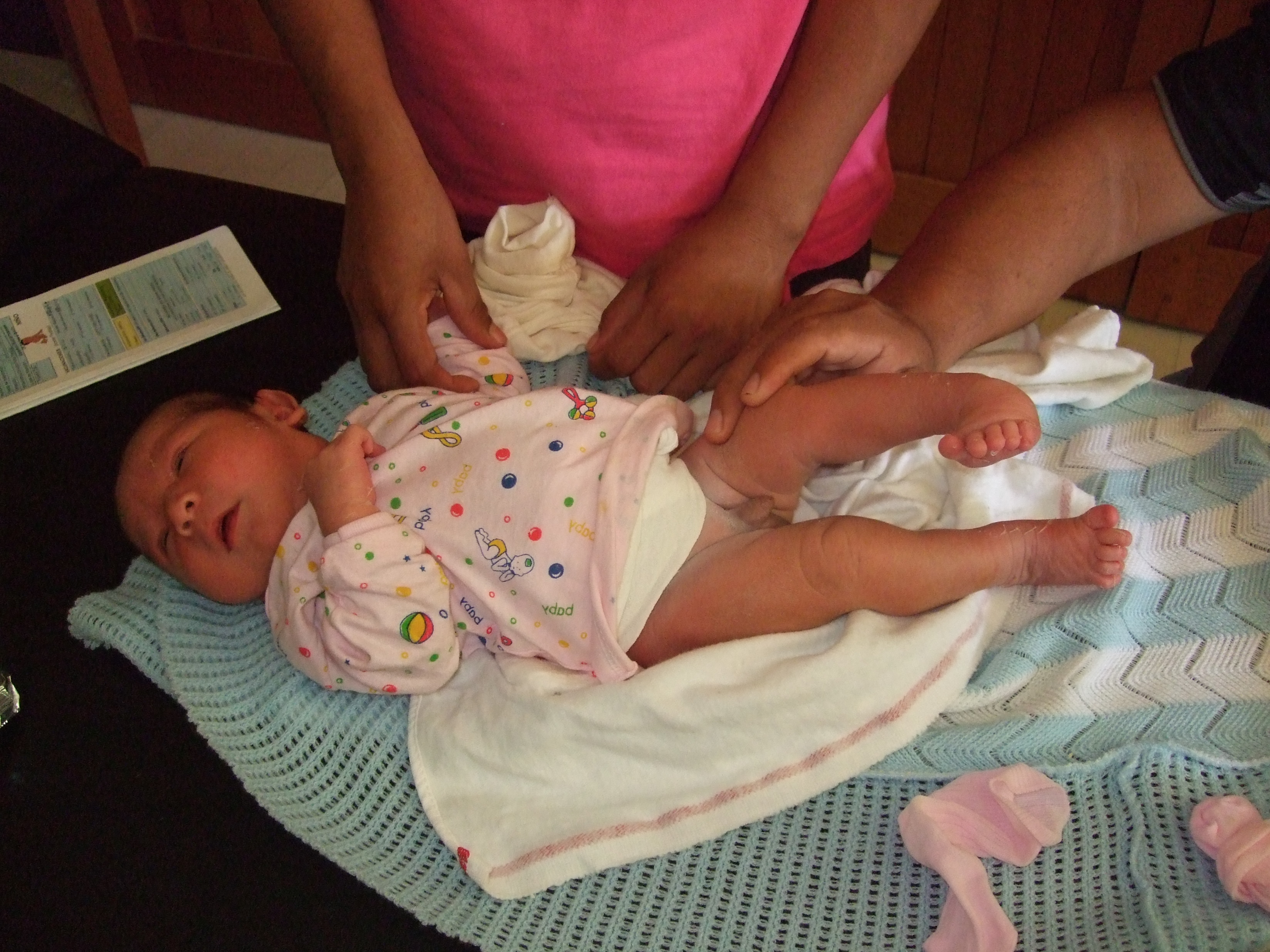
|
When it came time, three hours later, to return home, the situation had changed. The rain had slacked off, but it
had not come anywhere near stopping, and all the runoff from the surrounding rainforest was pouring into our normally
placid stream. I looked at the surging waters, and decided it would not be wise to try to navigate back by myself.
Juvencio has a large boat with a strong motor, so I asked if he would take me back across the stream, and he readily
assented. We therefore set out on foot for the village, but to get there requires crossing the bridge built a few years
ago by the Iquitos Rotary Club. This has been a tremendous boon to the community, all of whom have to troop out to the
main river to receive shipments of food and implements and whatever else that has been sent down from the city. The
only hitch is that one quarter of the bridge is in imminent danger of collapse. Both ends of the bridge are firmly
anchored, but the supports for the part that connects the half closest to the Amazon with the quarter closest to the
village have sunken into the substrate, leaving that section of bridge canted severely downward. The village has shored
up the sagging supports with angled wooden braces, and so far, it has held. Everyone crosses it, all the time, and the
children, I am sure, race pell-mell down one side and up the other. But one day, sooner or later, the whole blessed
thing is going to collapse, and if this happens when anyone is crossing it, they are going to die. I shudder every time
I have to cross it, and avoid using it when I can.
Juvencio had already safely passed to the far side, and as I stepped onto the sagging section, I held my breath and
said a few prayers and promised a few chickens in sacrifice, and by gum it worked, and I made it across, though the
slope on the side toward the village is now so tilted that my foot slipped backwards once or twice on the wet lumber. I
did not trust the handrailing on my side, which is seriously deteriorated and leans out over the tumbling waters below
me, and on the other side of the bridge the handrailing is gone altogether. Whew.
There was still the matter of getting into Juvencio’s boat. His adult son Martin was already on board, scooping
water out of the hull with an empty five-gallon bucket, and Juvencio soon came along with a container of gasoline. The
top of the bank is a good twenty feet/six meters above the water, and the only accommodation for going down is a series
of steps slashed out of the bank with a machete. These are not necessarily completely on the level, and can be a
challenge when dry. That day, of course, they were not dry, and were as slippery as everything else on the banks, and
there is no handrail. I went down cautiously, sideways, about half-way down, using my folded umbrella as a walking
stick (the rain had thankfully trailed off by then), then waited to see how I could best reach the boat. Juvencio
loaded the gasoline, helped with the dredging out of water, then came back up to give me a hand. Even with his lifetime
of living on this river, and his heavy-soled rubber boots, he slipped and nearly fell a couple of times. He offered me
his hand, instructed me to brace my downhill foot against his boot, and we inched down the incline. There was a fairly
sharp descent, then the bank flattened somewhat, and the steps became more manageable, so that even an aging gringa
could walk without assistance, and I succeeded in gaining entrance to the boat without falling into the slop.
Martin started the motor, and against the powerful current, we headed for the Lodge, Juvencio guiding with hand
instructions – pull over to the left here, watch for that tree racing along on the boiling waters, etc. – and we pulled
up to the boat dock. Climbing out was relatively easy, and there was a wide plank leading from the dock to the stairway
going up the bank. I bade them goodbye and started up.
At the top, I was dismayed to find that the wooden stairway is sliding down into the stream. Between the top step
and the flat walkway above it, a two-foot gap had opened up. I sucked in a breath, laid my umbrella on the upper
boardwalk, and hoisted myself over, gaining the upper level without falling.
17 junio 2022
The night we arrived, there was a large group of students at the Lodge, and a group of a dozen other travelers.
It was so good to see the activity, and feel the buzz again, as the young men, carefully masked and neatly outfitted
in white short-sleeve shirts and dark pants, moved from one table to another, delivering dishes, pouring beverages,
and watching hawk-eyed to see if anyone needed anything.
22 junio 2022
|
Our annual flood peaked in early May, and the water has been dropping very slowly. When Jerry and I got to the
Lodge a few days ago, the path between the boat dock and the dining room had been shoveled out, the sloppy mud piled
into dikes that will help to deflect (temporarily, anyway) next year’s flood, and fine white sand had been spread
along the walkway from the boat dock to the bridge leading to the diningroom. However, none of this had yet been
accomplished from the boat dock to my house. The day we came in, there had been sun and the mud was soft but not
mucky. However, that night it rained, and by morning, the surface was extremely slippery, sloppy mud. We walked to
breakfast gingerly, one slow and careful step at a time.
But when we returned to the house after breakfast, there were a couple of guys shoveling the wettest mud to one
side and spreading sand over the newly exposed path. They were a few feet short of our house, but they moved
quickly, and advanced just ahead of us, so by the time we reached the short boardwalk leading to my steps, they had
laid sand down just that far. Of course, now we have a lot of sand on the front steps and on the floor of the
house, but it is easy to broom it out, and it is far preferable to the clingy mud.
|
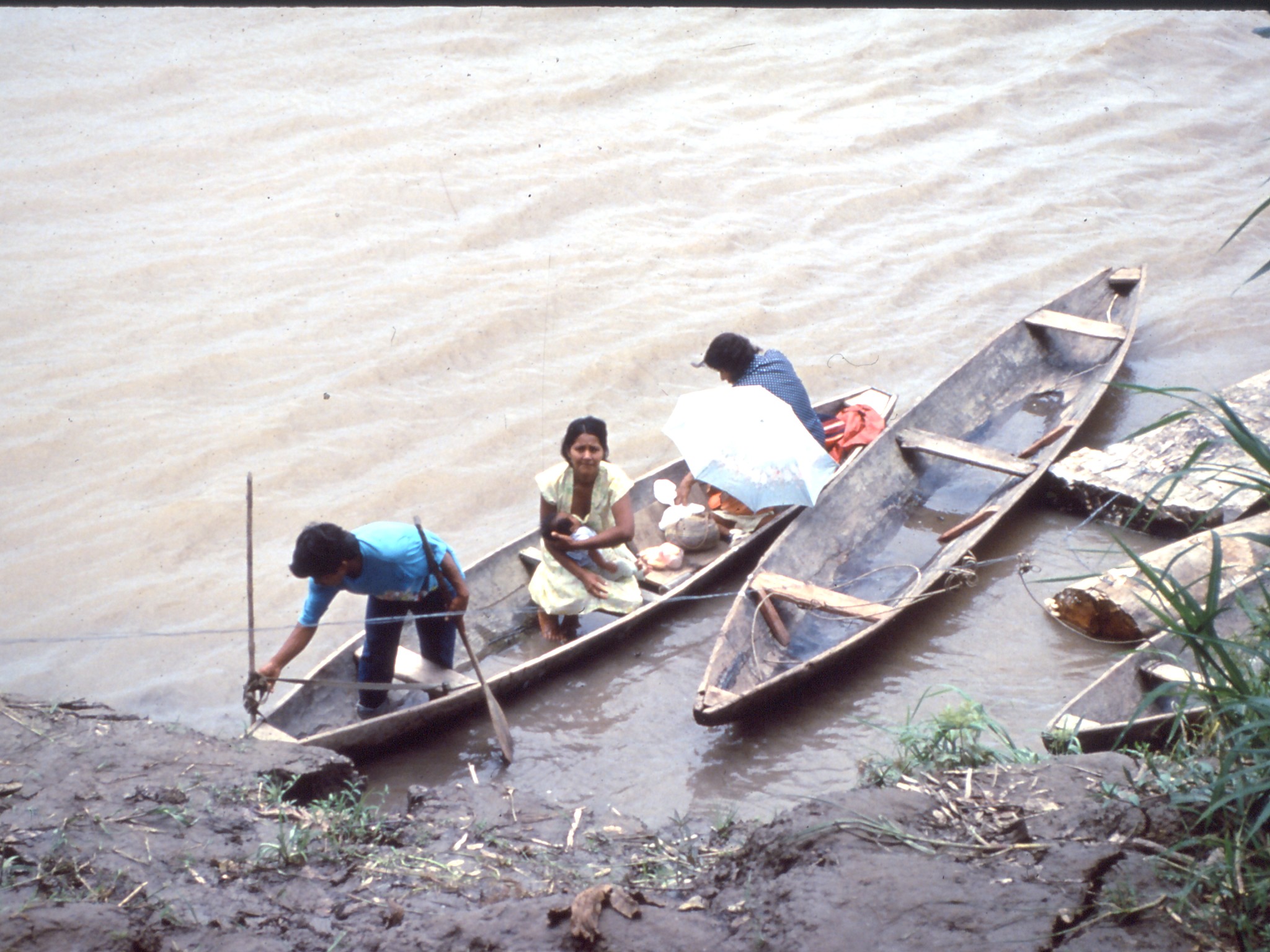
|
23 junio 2022
Today Kendra signed a six-month contract with the clinic. If she is happy with us, and we are happy with her,
and I think there is a much better than even chance that we will all be quite happy, she may become our newest
long-term employee.
She is 42 years old, with two grown kids and one adopted from her sister after the sister died of COVID. Her
degree is Tecnica de Laboratorio, Laboratory Technician, which means she knows a lot more than any of us about lab
studies, and has already requested the reagents necessary to do tuberculosis tests, and white blood cell counts.
And she can probably do Gram stains, and heaven knows what else.
Our laboratory capacity has always been very limited, although Juvencio is an expert at malaria smears. To have
someone who can do more, and who can also start IV lines and give vaccines and be a nurse when there are no lab
duties, will be a real benefit for the clinic.
Two days ago, a nine-year-old girl from a village upriver was brought in over the mid-day break, with vomiting,
diarrhea, stomach pain and headache. Her vaccines are pretty much up to date, and she and her family were neatly
dressed and although certainly not wealthy, did not appear to be among the poorest of this area. She did not have
fever, but she was weak to the point of nearly fainting, with sunken eyes and significant loss of energy. Dr.
Gianmarco diagnosed her with moderate dehydration due to gastroenteritis (“stomach flu”), and started her on
intravenous fluids and metronidazole. She stayed overnight in the clinic, and by morning was feeling better,
looking better, and taking food and drink orally without problem, so we discharged her with more antibiotics, and
instructions to come back in a week for follow-up and her first HPV vaccine.
Another child, this one a little over a year old, was brought in by a family from Nuñez Cocha, out on the Rio
Napo. She also had vomiting and diarrhea, plus a low-grade fever. Dr. Gianmarco gave her appropriate medicines
and oral rehydration fluid, and her family took her to the home of some friends who live near the clinic, since
their home on the Rio Napo is many hours away.
|
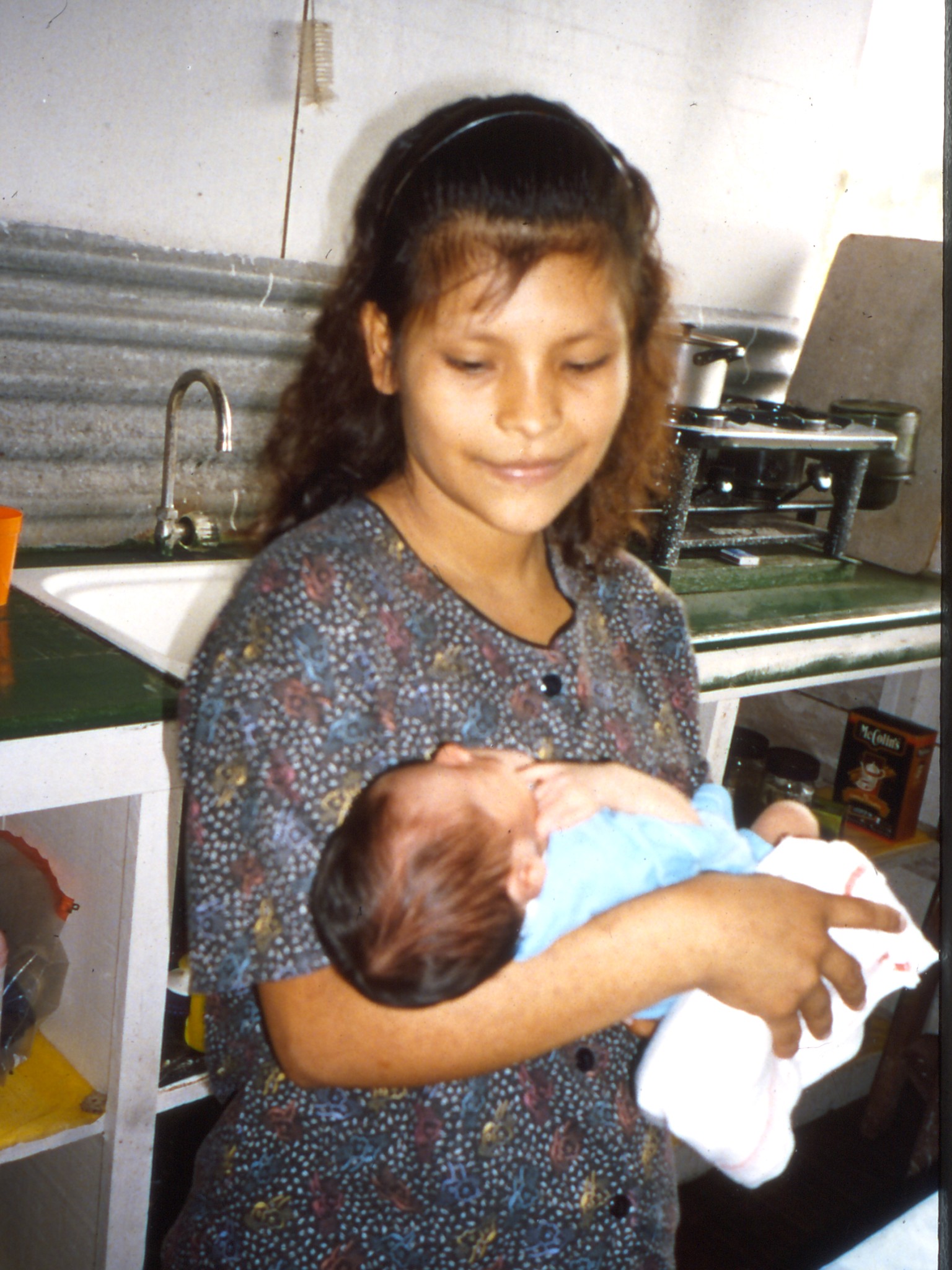
|
Two days later, they brought her back to the clinic, just about at the same time as the older girl, and now she
was unable to tolerate oral intake – everything she took in, she threw up -- and was notably dehydrated. Gianmarco
again started antibiotics and IV fluids, and kept her overnight, and she improved slowly. However, after one night
in the clinic, her parents became restless. The other little girl was doing better and was discharged in the
morning, and by afternoon, the parents of this child wanted to leave. We tried to convince them otherwise. She did
not look like she was about to die, but she did look more than a little sick, and she continued to have fever, and
even though she could now take fluids and a little food without throwing up, her eyes were still sunken. She really
should have stayed longer with IV fluids.
But the family had several other children at home, and they didn’t think she was getting better fast enough, and
they wanted to take her to a “curioso,” a shaman. I tried to convince them to stay longer, but they were insistent.
We had them sign a form saying they were leaving against medical advice, and that any untoward consequences could
not be blamed on the clinic, and I emphasized to them that they needed to continue to give her the meds that we sent
with them, and they promised to do so.
With a little luck, she will do ok. But I sure wish she had stayed a little longer.
|
25 junio 2022
Doña Maria has died. She has been going steadily downhill for at least five years, has been blind ever since her
failed cataract surgery however many years ago, and has had, I think, increasing dementia – though when I stopped by her
son’s house to see her two days ago, she immediately recognized my voice and greeted me with “Hola, Doctora,” when I
stopped at her bedside.
She fell a week or two ago, and has been unable to move her legs ever since. One of her daughters says her speech
has been often garbled, and she has been incontinent. I suspect she had a stroke.
At any rate, yesterday, on the fiesta of San Juan (alleged birthday of Saint John the Baptist, and a major cause for
celebration around here), at about 5:00 p.m., she finally let go. It was time.
Ah, but she was one of the last of her generation, and they were the last of the traditional and genuine Yaguas. She
spoke Spanish for much of her life, but she grew up speaking the Yagua language, which is now nearly extinct, and her
husband hunted with blowgun, and she lived the old culture.
26 junio 2022
Today was the funeral for Doña Maria. Almost all her family were present at her son’s house. There were also
quite a few neighbors and friends, only one of whom was visibly sloshed.
|
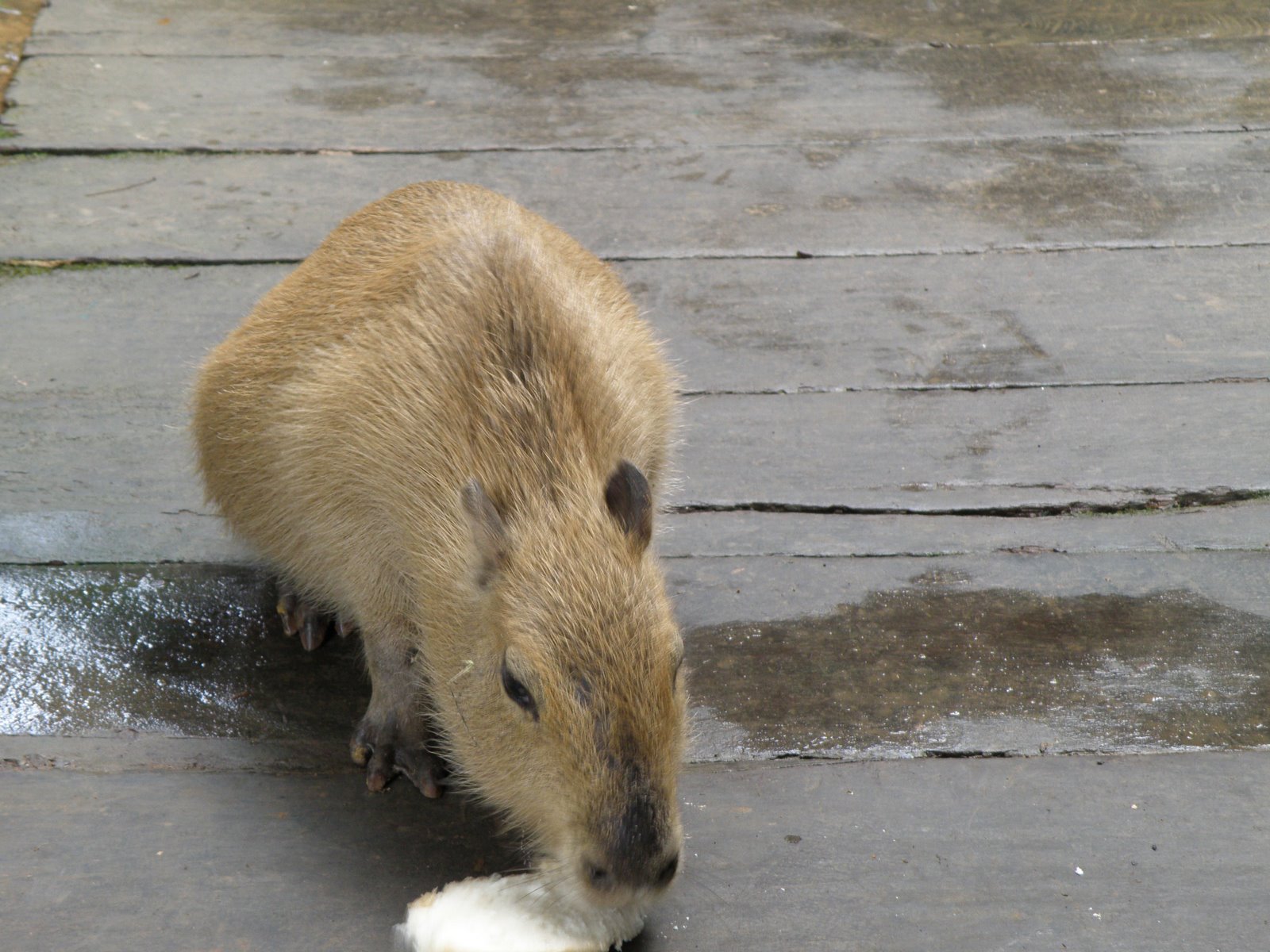 Photo Credit: Dan Freuchte Photo Credit: Dan Freuchte
|
Her son called the ceremony to order just about at 9:00 as scheduled, which impressed me (very little begins at
the officially scheduled time, in Peru). He thanked everyone for attending, then spoke of how much his mother meant
to him, and begged her to forgive him for whatever trespasses he might have made against her. He then asked if
anyone else had any words to say, and his niece stepped forward and offered more appreciation, plus a mention that
she had no need to ask for Maria’s forgiveness, for she had always treated her well. Then there were a couple more
speakers, then one of the local men launched into a fairly lengthy speech with a lot of references to the Bible, and
several appeals to God the Father, and a number of exhortations to live as the Bible instructs us, then he and his
wife sang a hymn. Then another. Then another, after which, thankfully, they stopped. Since the ceremony was being
held in a local home, there were no chairs. Everyone stood in place, which is a good way to assure that meetings do
not run on too long.
|
At this point, everyone was thoroughly saddened, and Maria’s daughters, granddaughter, and a neighbor or two, all
flung themselves at the casket, resting their weary heads on the coffin and shrieking, wailing, crying, and
generally making their grief known. I hoped to calm the atmosphere a bit, and lighten the mood a trifle – it was a
funeral, still, it can be what we now call a Celebration of Life, not just gloom. I spoke of how they had all known
Maria all their lives, and I had known her for over thirty years, and have danced with her at many San Juan
celebrations in the past. I reminded them that we all die, and that although she is now gone to her rest, she will
live on in our memories. I said she was one of the last of her generation, and that she lived a good long life, and
lived it on her own terms, and maintained the traditions of her community. I said that we all commit errors, but
whatever errors she may have made, they are now in the past. What remains is the good she did, and when they all
get to the time when they can remember only the good about her, and can summon a smile at her memory, their grieving
will be over, and she will live in all our hearts forever. The sloshed neighbor smiled approvingly, and shook my
hand warmly, and to my surprise there was also a ripple of quiet applause, so I think the words did accomplish at
least some of what I had hoped.
Then the lid of the casket was closed, and several men were enlisted to hoist it to their shoulders, and we all
set off to the Cementerio, which was just down the cement walk a short distance, over a couple of rickety bridges,
and up to a small hill where there were perhaps a couple dozen other graves, some with wooden crosses in various
stages of deterioration. There was one for her third and last husband, who died 19 years ago (reportedly also on
the San Juan holiday), and a new, neat excavation for Maria, next to his grave.
The casket was set on the ground. Candles were lit, and placed at the head and foot of the coffin, and also at
the head and foot of several of the other graves. There was another speech by her son. Then a sturdy rope was
brought from a nearby home and strung beneath the coffin, and to my relief, they lowered the box into the grave
without tipping it on its side or dumping its occupant out. Then the men began shoveling the dirt back into the
hole.
26 agosto 2022
There was another round of COVID in Peru in July, and several of the clinic staff came down with it, for the
third time. Fortunately, their illnesses were mild, and everyone has recovered. We closed the clinic for a week,
except for emergencies, but are now back to normal operations.
20 setiembre 2022
The river is just about at its nadir, which is normal for this time of year. It is quite a bit lower than in an
average year, however, and is close to setting a new record low for the date. I could see the glistening mud at the
edge of the stream which indicates how far the water has fallen in the last day or so, and it is a good six inches.
It should start coming up pretty soon, but I have no way to know when that will occur.
21 setiembre 2022
This morning, the stream has fallen a few more inches. Golbert and Ari used my canoe to make a bridge from the
last steps on one side of the stream, to the first ones on the other side. They have the canoe corralled between
two palisades of poles stuck into the stream bed, and the poles serve as handholds (the canoe does bridge the
stream, but it rocks in the water so a handhold is welcome).
I do not need to use my paddle in order to cross the stream. I am accustomed to always having the paddle in my
hand when I head for the clinic, and it felt strange to leave the house this afternoon without it.
I have run across several frogs in the house, which I regard as a good sign. I am not crazy about having them
around -- they leap from the wall to the floor, landing with an unreasonably loud thump, which startles me, and
every now and again one jumps near me, or even on me, which also startles me. Snakes, however, do like frogs, which
means that if there was a snake around, the frogs would either have been eaten, or would have lit out for safer
pastures. Thus, the presence of frogs in the house is a pretty good indicator that there are probably no snakes.
26 setiembre 2022 – lunes (Monday)
Yesterday afternoon, I walked down to the river. I came in on that path when I arrived last Tuesday, but had not
been back since.
And oh my, things have changed. Since Socorro and Polaco moved into the city, the undergrowth has exuberantly grown.
The small lake where there were cayman (between crocodile and alligator) has been overtaken by entropy and is filled
with plants. The path now goes on a completely new route, close to the fence that used to enclose the sugar cane field,
and emerges just outside the trapiche, the sugar cane press. But the new owner of the property is not making sugar cane
rum, and there is no sugar cane any more. After all the years of passing the cane fields, they have been replaced with
bananas and weeds. And the grade school, long abandoned because most of the families who used to live along the river
have sent their children to school in the city, is being claimed by the river, with one front corner already fallen in.
The world changes, whether or not we want it to.
29 setiembre 2022
I have been in Iquitos the last couple of days, running the usual errands, with the usual mixed bag of success
and disappointment. I got the clinic’s oxygen tank filled, and got the broken valve off another tank. I will take
it back to the U.S. and see if I can find a replacement.
And I succeeded in collecting the latest batch of vaccines this morning. I stopped by the vaccine center
yesterday to drop off my list of requests – they had all but the pediatric influenza vaccine – and Evelyn, the young
pharmacist in charge of the office, said I could come by this morning to pick them up. However, when I called her
early today, she murmured something about a “plantón,” and asked me to come at 8:30 instead of 7:30, which was going
to be cutting it a little close, if I was going to get the vaccine thermos onto the boat operated by Edemita’s
daughter and son-in-law, which would head downriver at 9:30.
|
I wasn’t quite sure what she meant by a “plantón”, but figured it must be some sort of delay. “Plantar,”
literally, “to plant,” means to be stranded. However, when I arrived at the Regional Health Authority, where the
vaccine department is located, along with all sorts of other departments, there was someone in the entryway with a
loudspeaker, exhorting something or other, and a lot of people standing around in their official uniforms doing not
much of anything except looking expectant. Uh-oh. This has the look of a demonstration of some sort. In Peru,
people are fond of their paros (work stoppages) and huelgas (strikes) and manifestaciones (demonstrations). I must
admit, their goals are often laudable. They want better work conditions, better pay, better equipment and support,
etc. When people are working in tuberculosis labs without masks or gloves, for instance, they certainly deserve
better. And the government often offers pay that it then doesn’t deliver.
|
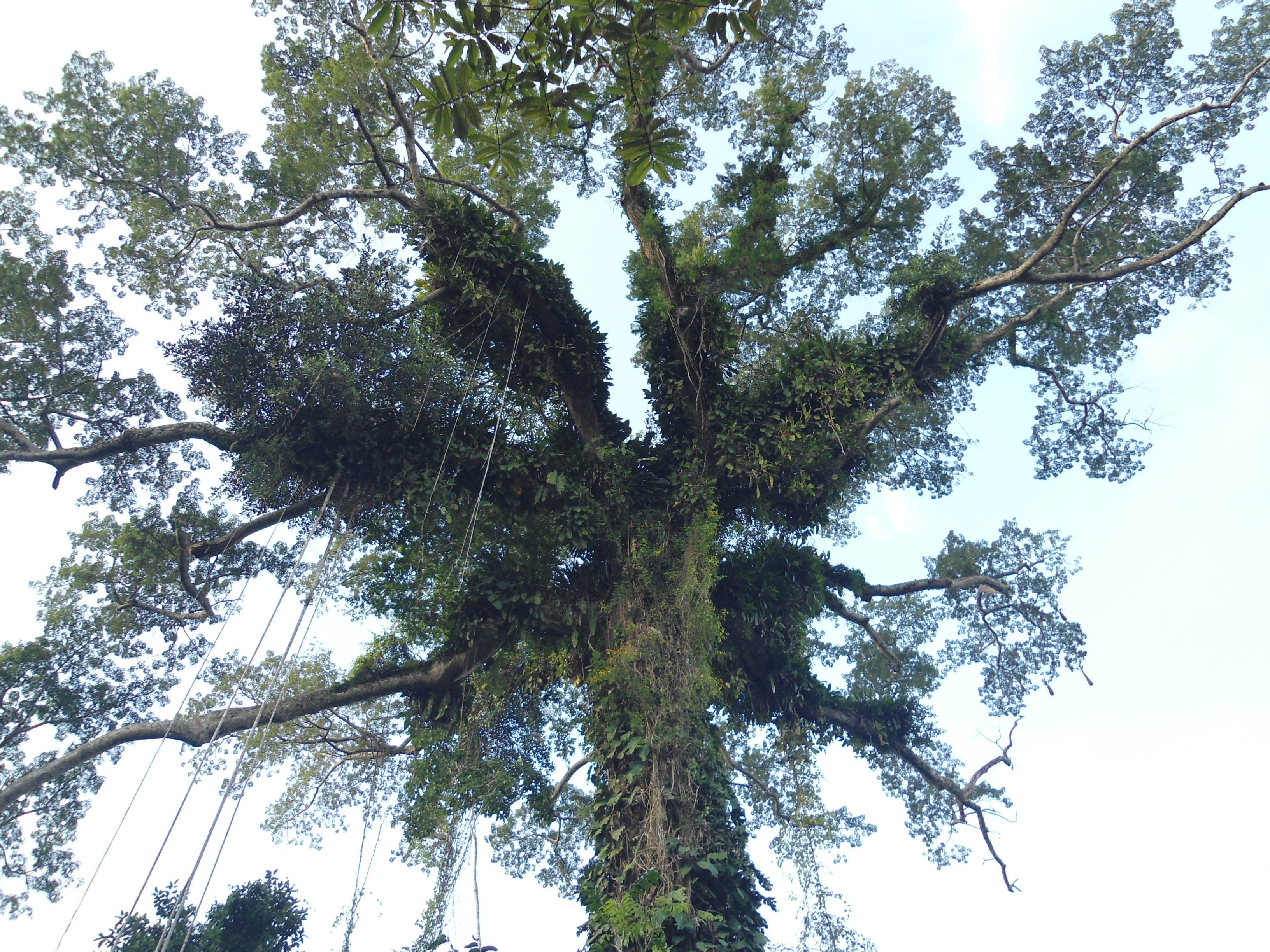
|
However, as far as I can see, these various stoppages don’t ever seem to gain much traction as far as reaching
their goals, and they cause a great deal of disruption in the care of patients, and the economy, and so forth.
So I boldly walked in right past them. Evelyn was in her lair, she put the vaccines into my thermos box, and I
marched back out through the growing crowd, encountering a few looks but no real resistance, and now we have
vaccines for the next couple of months. And I made it back to Explorama’s office in time to get the vaccines to
Edemita for her daughter’s boat.
02 octubre 2022, Yanamono
The neighborhood is preternaturally quiet this morning and early afternoon, the reason being that today is
Election Day. Unlike in the U.S., where voting is a right, here it is a civic duty. It is illegal not to vote, and
one is fined if one fails to do so, although companies such as Explorama who need workers on duty on the day can pay
the fine for those workers. At the clinic, there is a fifteen-year-old on guard duty until Jorge and Willer return
from voting in Indiana. Now, the village across the stream is deserted except for children and elderly
grandparents, but by late afternoon, everyone will be returning, and the sugar cane rum will be broken out, and
celebrations will commence.
I am relieved that I do not have this responsibility. I am a Resident Immigrant, but not a Peruvian citizen, so
I am not eligible to vote. If I were, I would be stumped. These are local and regional elections, so there are
many mayoral candidates, many candidates for regional governor, and so forth. Unfortunately, as far as I can tell,
none of them is lean and hungry. On the contrary, they are all very round-faced, and look as though they have had
their paws into many pots, which they probably have. Even worse, evidently most are in favor of building highways
through the rainforest, in the name of development, as though that were automatically a good thing. My own country
ravished its natural resources centuries ago, so it is hard to say that Peru should not do the same, nonetheless, I
think that development could be done in a sustainable way, and putting roads through the forest is not going to
achieve that.
Evidently the idea is to build a ferry across the Napo River at Mazán, then a highway north to Estrecho up on the
border between Peru and Colombia. This road would cut right through virgin rainforest, and the tribal lands of the
Maijuna people who have lived there for decades. Even worse, there are plans to put in palm oil plantations. All
over the world, rainforests, which filter the air, moderate global warming, and provide habitat for all sorts of
creatures both animal and plant, have been cut in order to plant palm trees for their oil, which is about the least
healthy oil there is, loaded with saturated fats and good for nothing except gorgeous profits for the planters,
while the rainforest disappears, and along with it, animals, plants, insects, habitat and traditional ways of life.
Oh dear.
I am glad that I won’t be around by the time it all happens, but it is nonetheless sad to contemplate. I told
one of the young lodge workers that his grandchildren will not be able to comprehend the world in which he grew up,
because it will be gone. He looked blankly at me – he can’t be more than twenty years old, so he can hardly imagine
being thirty, much less having grandchildren, or having lived long enough to see changes on the face of the earth.
14 octubre 2022
And the festivities continue at Las Palmeras, as they have done for the last several days. I was a little
nonplussed at all the fuss, especially when I saw the little pamphlet they had printed up announcing the various
activities. There are assorted demonstrations, and contests of singing and folk art and dancing, and the election
of a Miss Palmeras, and lots and lots of soccer games including an ongoing campeonato (championship series) that is
matching teams from multiple villages from up and down the river, and a seemingly non-stop narrative issuing from a
loudspeaker system from someone who sounds like he does this for a living.
According to Edemita, in the mid-1980’s there was a thriving ribereño community at the river’s edge, and a few
old-timers living farther inland. One of the local men became upset that he was mocked for being indigenous, and
his kids were being picked on for being stupid, lazy, backward Indians. So he and a few others decided to move
inland, and he went through whatever legal manipulations were necessary to form Las Palmeras Segunda Zona, and have
it legally designated an indigenous community.
The community has not always been openly proud of its heritage. Who wants to be an Indian, if Indians are dumb
and backward and lazy and picked on? When Fernando was trying to teach the Yagua language at the library, there was
pushback from some parents who did not want their children to learn this outdated and useless language.
But Eda says that in recent years people have come to see that in fact they do have a heritage that is worth
preserving, as far as can still be done, and some of those who formerly opposed the teaching of the Yagua language
are now strong proponents.
So, the festivities go on, and Saturday night will culminate in a large fiesta with dancing and cerveza and
plenty of sugar cane rum. A few years ago, I would have gone myself, but tomorrow night I am hoping to be on my way
to Lima, and thence to Wisconsin and Jerry.
Early noviembre 2022
Well, it’s been an interesting year.
|
In February, we got WiFi at the clinic, thanks to a satellite receiver. For years, I debated as to whether it
would be worthwhile to do so, but we are now being pushed to have better communication for several reasons. One is
that, since the pandemic began, I have been spending quite a bit less time in Peru than I have habitually done.
Like much of the rest of the world, I now do a lot of clinic management remotely. But this means that the clinic
needs to be able to communicate with me. Having internet access means they can scan and send me documents such as
receipts for clinic purchases, patient registers, and all sorts of other items necessary for the day-to-day
functioning of the Clinica Yanamono. It also means that, even though we don’t have cell phone reception at the
clinic, they can talk with me by calling on WhatsApp. This relative ease of communication not only makes it
possible to do my work from Wisconsin, it means that Edemita has some sense of my presence even when I am far away,
which I think is a help to her as she runs the clinic in my absence.
Another factor pressing us to improve our communications is the fact that the Peruvian government now wants all
the patient data entered into their online system. Gone are the years of recording monthly data on sheets of paper
which we then delivered to the various departments. Now every patient (including many on whom we never were
responsible for reporting in the past) needs to be registered online. This should improve Peru’s data collection,
making it possible for the country to better coordinate its health care. But again, it requires internet.
|
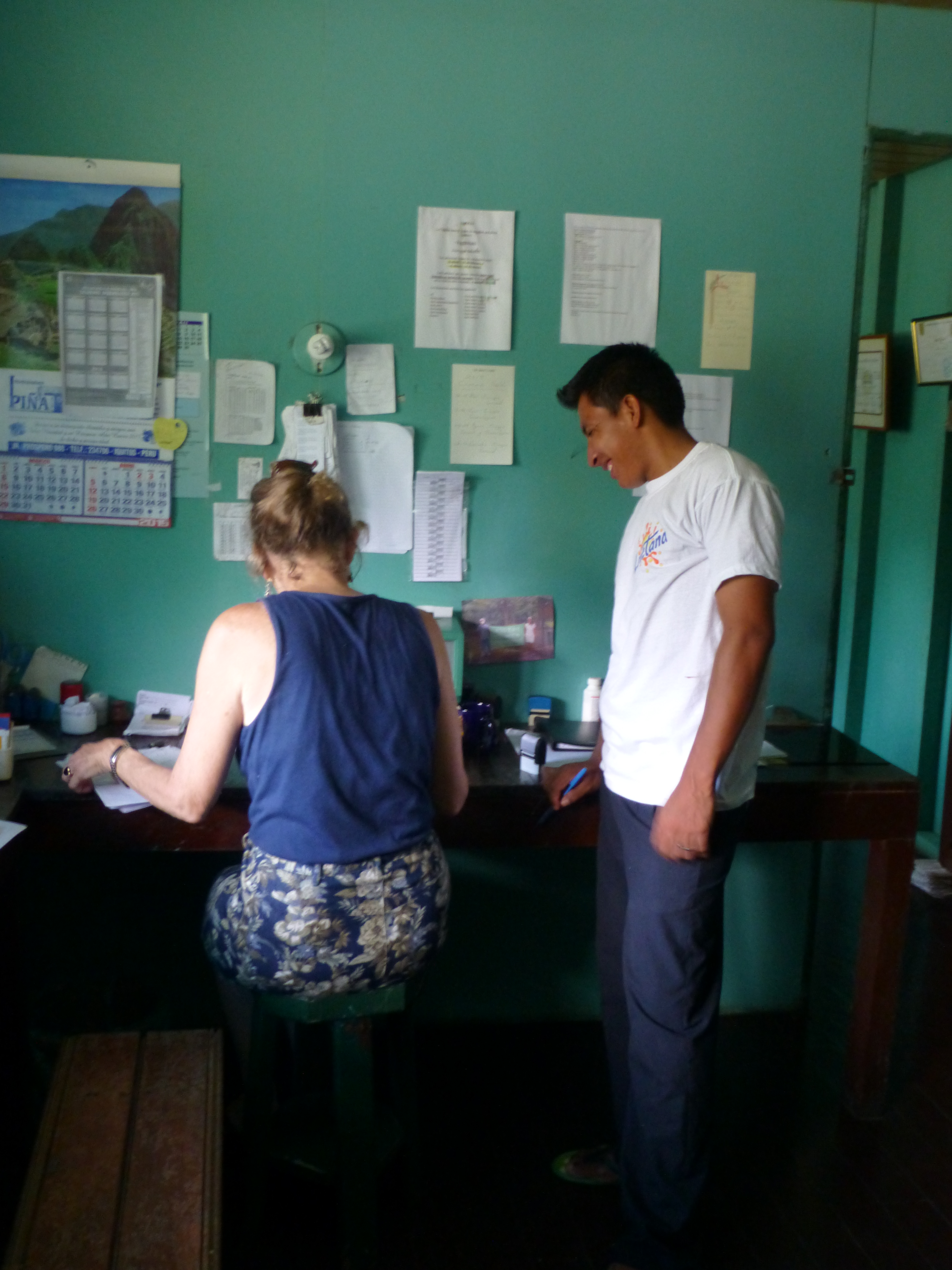 Photo Credit: Kelly Riddle Photo Credit: Kelly Riddle
|
Thus, we have quickly become completely addicted to the WiFi. And, although it is expensive, the service we get
is excellent. In most places in Peru, internet speeds are slow, and there are frequent outages. The quality of the
signal we have been receiving is excellent -- except for when the supplier had a major equipment failure, and we
were without WiFi for a month. We are now back in action, however, and once again the service is excellent. It
is so very helpful to be able to communicate.